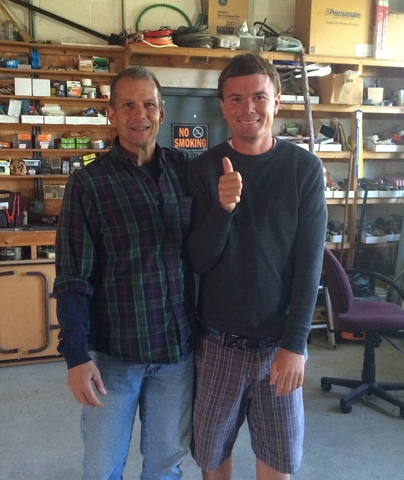I was really, really nervous.
During a visit to the east coast the first week of May, my son Matthew and I stopped by Camphill Soltane, the college program for people with disabilities that he attended in his late teens and early twenties. Matthew has autism, and this was not just casual homecoming. We were there because Matthew wanted desperately to apologize to, and to be forgiven by Tom, a mentor and friend who'd been the subject one of his most threatening outbursts.
The confrontation happened during an anxious time of Matthew's development, a stage that lasted a good long time. Regular conversations often escalated into shouting matches, kicking, screaming and worse. But very soon after these outbursts, Matthew was remorseful and insisted on apologizing, sometimes just a few minutes after flipping out, often demanding forgiveness on the spot, inflaming an already tense situation.
"Just saying your sorry doesn't always work," I'd tell him, "You need to give people time and space."
"How much time? 5 minutes, two months, or six months?"
Over the years, I've used personal social stories to discuss complex issues with Matthew. I told him about the friend that never called me back, and how I realized that it wasn't because she didn't like me, but because she was busy with her family and her work.
I told him about the boy I really liked that liked another girl better because he had more in common with her (I told many versions of this story and expect I will continue to). I fabricated, to make a point, a story about the friend that I over-called, and that this bothered her so she decided not to call me back. Ever. This taught me that it' s best to call just once, and to leave a message.
When I tell Matthew these stories, some more accurate than others, he listens intently, his wide brown eyes locked with mine. He asked for details and draws hopeful conclusions.
"But have you seen the friend that you over-called and does she still like you?"
The most complex issue by far is the notion of apology and forgiveness. There are so many painful variables. Sometimes people hurt you, but they don't apologize. Other times you apologize, and people say "I forgive you," but then they don't act like they really forgive you. Or you apologize, and you are not forgiven.
***
I followed Matthew along a winding path through the lush green landscape of Camphill Soltane as he searched for Tom, who, among other things, maintained the landscaping equipment for Camphill Soltane-lawn mowing tractors, snow-blowers, weed whackers and the like. Matthew had attempted to contact Tom in the years since the confrontation to apologize with no luck.
"I need to tell him that I'm older now, and that I'm a nice guy and a hardworking trustworthy man."
As we wound our way towards the maintenance building where Tom worked, Matthew muttered in conversation with himself, "Just tell him that you are sorry about what happened in the past, Matthew, and he'll be happy. But if he isn't, back off, OK Matthew? You are still a good trustworthy person. "
***
The year was 2005. I had too much time on my hands, was probably bored, and had been careless. I was talking to a friend on the phone and repeated a silly, insulting rumor I'd heard about another friends son.
"You are KIDDING," my friend laughed, "His mom would be mortified!" she laughed some more, before hanging up and phoning "his mom." and relaying what I had just told her.
"His" mom called me back. What had I said? Why did I say it? I thought we were friends, close friends. How could you be so cruel?
I felt my face flush, and my stomach churned. I am so, so, sorry, I said. My friend remained silent. She had been so kind to me when Matthew was diagnosed with autism. I had taken care of her children when she was sick.
"Loose lips sink ships," my mother often told me.
In just moments.
I apologized again in the form of a note, and dropped it off with a bouquet of flowers. The silence continued. It would be years until we chatted(superficially) again, but our friendship would never be the same. I'm still grieving the loss of this friend. Just writing about it now fills my throat with a lump of regret.
***
Matthew paused before pushing the door to the maintenance shed open. There stood Tom, who smiled broadly, seemly genuinely happy to see us.
"Matthew! Look at you! You are a man. How are you, buddy?"
Matthew launched right into what he came to say.
"I'm sorry for what happened when I yelled at you and said mean things. I'm very serious. I'm not like that anymore. I'm a nice guy and I'm very trustworthy. I've been feeling bad about what happened for a long time."
"Oh, Matthew," Tom said, putting his hand on Matthew's shoulder "That was so long ago, and I forgive you. You don't have to worry about that anymore. Shake hands?"
Matthew looked stunned, then relieved, then asked me to take this picture, proof of the great thing that had just happened:

Matthew forgiven
"Well, it was nice seeing you again, Tom," Matthew said, rushing to the door, anxious to leave to preserve his big moment, "Take care," and he laughed giddily as we found our way back to the car, and on an off for the remainder of the day.
***
Matthew and I flew home to California a few days later after sightseeing joyously in Philadelphia and New York City. It was as if a vice around his heart had loosened and dissolved. I'd never seen him so relaxed, and content.
"Great trip," I said as we landed in California. "What was your favorite part?"
Which, of course, was a silly question.